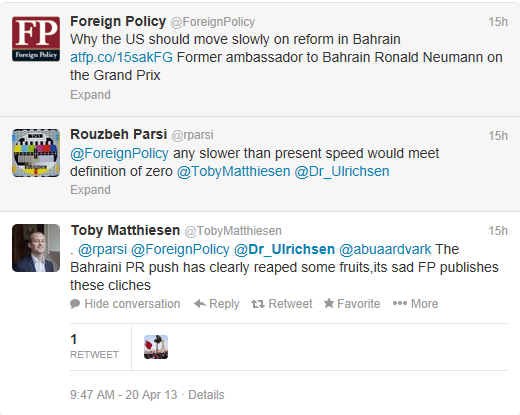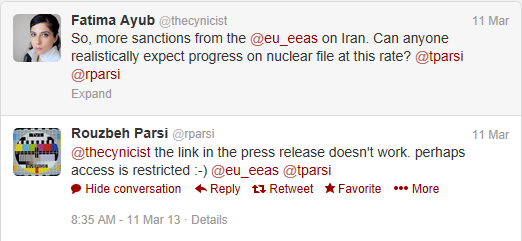Rouzbeh and Trita Parsi: Both sides of the Atlantic
On January 17th, 2013, the Institute for Middle East Strategic Studies (IMESS) held a seminar on “Europe, Iran, and the Arab Developments”. The IMESS resident and visiting fellows, faculty members, and a number of PhD and postgraduate students from different universities in Tehran attended the seminar. The one thing that doesn’t really strike me but will as always come as an “unexpected blow” or “surprise for those who live in a constant denial of the Iranian factor, is the fact that Arab developments are discussed and raised in Iranian orchestrated seminars and yet they claim that they are never concerned or interfere in Arab affairs.
The director of IMESS Dr. Kayhan Barzegar, moderated the session. Kayhan Barzegar is a Senior Research Fellow at the CSR, the Department of Foreign Policy Studies. He is also an Assistant Professor of International Relations at Science and Research Campus, Islamic Azad University, and a Senior Research Fellow at the Center for Middle East Strategic Studies in Tehran. Some of his work includes Balance of Power (Great-Iran-com) and Iran Foreign Towards Iraq and Syria as well as The Shia Factor in Iran’s Foreign Policy.
The seminar was held with the participation of Dr. Rouzbeh Parsi, a senior research fellow at the European Union Institute for Security Studies (EUISS). I previously wrote about Trita Parsi and the National Iranian American Council.
Rouzbeh Parsi is the brother of Trita Parsi who recently blogged together on the 31st Anniversary of the Iranian Revolution. One thing that made sense is the tactics and style the Iranian regime uses which is to “coerce the Iranian people to acquiesce to the absolute rule of an unelected guardian, the government is accomplishing a revolution in a literal sense, by creating a circular movement that ends where it started.”
Rouzbeh has been a Research Fellow at the Paris based European Union Institute for Security. He deals with Iran, Iraq and what they so constantly term, the Persian Gulf.( However I prefer to use the term Arabian Gulf as history proves the Gulf has always been surrounded by Arabs).
Previously he was a Lecturer at the Department of Interdisciplinary Human Rights Studies (2003-2009) at Lund University Sweden which he helped set up. He holds a PhD in History from Lund University on identity formation and nationalism in modern Iran. Rouzbeh’s research interests include the domestic political developments of Iran and their foreign policy implications, governance and political culture in Iran and Iraq, and regional relations. He has worked on the development and change of political concepts that while universal are also locally embedded, e.g. modernisation, religion, nationalism and secularisation. Funny the term secularisation when Iran is far from it.
Rouzbeh, who you can follow on twitter here is not surprisingly a follower and concerned with the Bahrain Human Rights all Wrong crew and a commentator when it comes to Bahrain.
Funny that Toby forgets to comment on the Iranian regime PR that he is discussing Bahrain with. And still, he will never admit the influence of Iran.
The European Union Institute for Security Studies (EUISS) is the Union’s agency dealing with the analysis of foreign, security and defence policy issues. The Institute was set up in January 2002 as an autonomous agency under the Common Foreign and Security Policy (CFSP) to foster a common security culture for the EU, support the elaboration and projection of its foreign policy, and enrich the strategic debate inside and outside Europe. Based in Paris, with an antenna in Brussels, the EUISS is now an integral part of the new structures that underpin the further development of the CFSP/CSDP.
The Institute’s core mission is to provide analyses and fora for discussion that can be of use and relevance to the formulation of EU policy. In carrying out that mission, it also acts as an interface between European experts and decision-makers at all levels- read more here of how they are all interconnected.
The Institute is funded by the EU member states according to a GNP-based formula. It is governed by a Board, chaired by the High Representative of the Union for Foreign Affairs and Security Policy (HR), which lays down its budgetary and administrative rules and approves its work programme.
At the EUISS, Rouzbeh Parsi has published on Iran’s nuclear programme, political developments and regional affairs. He organises seminars in Paris and Sweden and participates in international conferences and advises policy makers in EU institutions and Member States. A note to be made regarding the European Union Institute for Security Studies is that there are no Arab academics.
The Iranian influence has spread across the world and it has been establishing itself worldwide for decades.
During the IMESS seminar Rouzbeh stated the following “We should also remember that Europe has had no influence on the Persian Gulf region. How can a European country promote democracy in the Persian Gulf littoral states? If all the Arab countries are dependent on a single country, that country is the U.S. These countries have so far had less cooperation with Europe regarding security concerns and Europeans do not wish to offer such cooperation to the extent that the Arab countries desire. The reason is that the EU does not wish to enter this area. Even if Europe enters the region it should cooperate with the U.S. regarding the establishment and promotion of democracy in these countries. Business, yes! I mean Europe is interested in to cooperate regarding the business issues. But if Europe cooperates with Bahrain for instance on security issues, then the European Union will also be responsible for what the Bahraini regime does or refuses to do. Of course some of the European countries have separately agreed to cooperate and they have taken some steps in this regard. The European Union, however, has so far refused to do so because it does not want to take the responsibility. “
More recently I read an article called What does the Gulf think of the Arab Awakening? I have to ask, who was actually contacted from the actual Arabian Gulf (besides Iran and the usual anti Gulf State bloggers) although Dr Ulrichsen naturally recommends it. If you read it, it’s as if @Dr_Davidson wrote it with the constant referral to “soft power”.
The first edition, edited by Fatima Ayub, focuses on how they view the Arab Awakening, again the main concerns is Saudi Arabia, Kuwait and of course Bahrain.
Fatima Ayub’s connections?
The European Council on Foreign Relations (ECFR) is the first pan-European think-tank. Launched in October 2007, its objective is to conduct research and promote informed debate across Europe on the development of coherent and effective European values-based foreign policy. It is independent and has no connection to the institutions of the EU. See below for information about its various sources of funding.
Like his brother, Rouzbeh who also attends NIAC’s meetings in USA, keeps a close contact with Iranian embassy in Paris and has obtained an influential job in EU’s Iran policy making circles. He advocates increased trade and engagement with Iran despite EU’s new policy of hardening sanctions while dissuading support for the real opposition. The pair recently attended the European Parliament’s Delegation for Relations with Iran, read more “Iranian Embassy” Inside The European Parliament
Trita is the expert when it comes to keeping tabs and a constant Iranian regime lobbying power in the United States and Rouzbeh does the same in Europe. A match made in heaven for the Iranian regime but a disaster for the Arab world.






